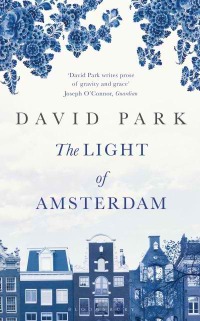
Published by Bloomsbury USA on November 13, 2012
A woman who should be content with her marriage instead feels insecure and makes needless drama for her husband. A man maps the course of his self-destructive downfall and then feels sorry for himself, in part because he has alienated his son. Given the chance to join her daughter's celebration of her forthcoming marriage, a mother instead spends her time moping and brooding and, yes, creating drama for her poor daughter. Awash in self-pity, these gloomy characters from Belfast visit Amsterdam on the same weekend. I'm surprised the city survives.
Marion and Richard are taking a break from the business they own to spend a weekend in Amsterdam. Marion is obsessively and irrationally annoyed by Richard, a form of madness to which she is driven by her feelings of inadequacy. She is convinced that Richard is having, or is preparing to have, an affair with one of their employees. Marion responds to her fears in a way that struck me as utterly ridiculous, the sort of contrivance that would appear only in a novel, never in real life.
Also visiting Amsterdam is Karen, who works as a cleaner in a Belfast retirement home. Karen's daughter Shannon is having a "hen party" in Amsterdam before her wedding, an event that requires Karen to dress as an Indian on the flight and during the first night of partying. Karen might be the most complex of the book's characters, both in her relationship with her daughter (the nature of which she can't quite grasp) and in her inability to understand her own behavior. Karen's bitterness leads her to make the sort of self-indulgent proclamation that has fueled many a soap opera: if Shannon's father is invited to Shannon's wedding, Karen refuses to attend.
Alan is an art professor who lost his marriage over a brief dalliance with a graduate student. Alan's wife Susan wants to move to Spain to open a guest-house (doesn't everyone?), but the weekend she schedules to look at a property is the weekend Alan plans to spend in Amsterdam, attending a Bob Dylan concert. Alan charitably agrees to take their troubled sixteen-year-old, Jack, with him, thus freeing Susan to spend the weekend in Spain with the man Alan and Jack both depise. Jack is moody and withdrawn; he treats his parents with scorn. The sections of the novel that feature Alan and Jack focus on Alan's frustration as he attempts to connect with his son. Although their story is familiar and not particularly insightful, it at least feels authentic.
The characters come within sight of each other at the airport and cross paths from time to time as the novel progresses. The pace slows after the characters arrive in Amsterdam, as if David Park needed to give each of them something to do but didn't quite know what. Alan repeatedly runs into Karen and seems interested in her when any rational man would flee from her at top speed. Their interaction is all that ties the three stories together, yet it doesn't amount to much.
The story is marred by page after page of mind-numbing exposition as Park tells us what his characters are thinking -- and they are always thinking, always about themselves. The characters are introspective to a stupefying degree. They come packaged with soap opera quality backstories and they all seem intent on injecting needless drama into their lives. Perhaps the characters accurately represent the self-absorption of a significant percentage of the population, but the novel has little to say about them that isn't obvious, which makes reading about them a tedious enterprise.
Having vented my frustration with the book's characters, I should note that there are some aspects of The Light of Amsterdam that I admired. Sullen and resentful, afraid of doing the slightest thing that might call attention to himself, Jack is a keen portrayal of a teenager who is the embodiment of angst. Park's prose is lucid and his dialog is realistic. In the end, however, the story seems pointless, amounting to unresolved slices of wearisome lives, and the abrupt ending is bizarre.
NOT RECOMMENDED